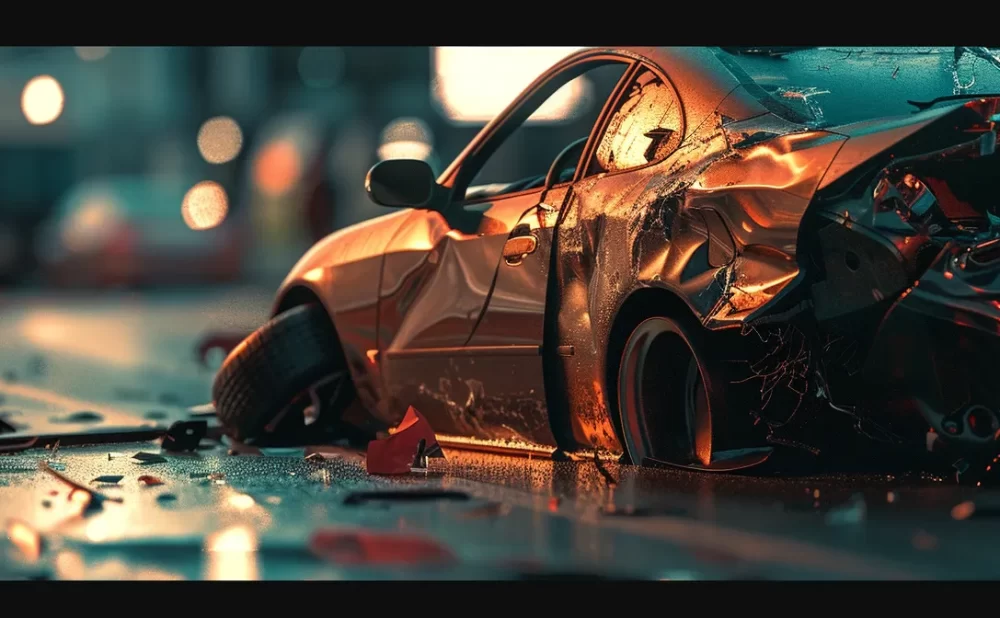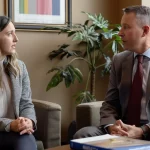In the unsettling moments following a car accident, it’s crucial to recognize Mistakes to Avoid After a Car Accident that could jeopardize your claim for damages. This article will guide you through critical errors such as neglecting to call emergency services, mishandling interactions with your car insurance company, and the often-overlooked importance of a chiropractic evaluation. Recognizing these pitfalls shields you from further distress and protects your rights. For anyone navigating the aftermath of traffic incidents, this content offers practical advice to help secure the compensation you deserve.
Key Takeaways
- Immediate action after a car accident is crucial for health and legal outcomes
- A police report and medical records are foundational for a strong personal injury claim
- Avoid admitting fault at the accident scene to protect your legal interests
- Legal counsel is vital in dealing with insurance adjusters and securing fair compensation
- Assess the full extent of damages before settling to ensure adequate compensation
6 Common Mistakes to Avoid After a Car Accident
Dealing with a car accident claim is challenging, and your initial actions significantly impact your case’s outcome. Unfortunately, many traffic accident victims unknowingly harm their financial recovery by making avoidable mistakes. Here’s a concise guide to the six critical mistakes you must avoid after a car accident:
1. Failing to Call Emergency Services Immediately

When a motor vehicle incident occurs, immediate action is paramount. Contacting emergency services not only ensures timely medical attention but also facilitates the creation of a police report—a document of critical importance for any legal claim. A lawyer can attest that delays in seeking medical care can detrimentally affect both one’s health and the strength of their case. This section delves into the necessity of prompt action following a vehicle accident, highlighting the legal and health implications of any hesitation.
The Importance of Police Reports in Legal Claims
In the aftermath of a car accident, securing a police report is a strategic move that bolsters a car accident claim. This document serves as an authoritative account of the incident, providing insurance companies with essential details that can influence the outcome of insurance negotiations. The report’s impartial perspective is invaluable, as it offers a foundation for communication between legal representatives and insurers, ensuring that the victim’s narrative is corroborated by official evidence.
Moreover, the absence of a police report can lead to challenges with insurance companies, who may question the legitimacy of the claim. It is a common scenario where insurance adjusters seek any opportunity to minimize payouts; a well-documented police report can counteract such attempts, reinforcing the claimant’s position. In essence, the police report acts as a shield against the tactics of insurance companies, which might otherwise exploit the lack of official documentation to the detriment of the injured party.
How Delaying Medical Attention Can Harm Your Health and Case
Delaying medical attention after a car accident can have severe repercussions for both one’s health and the viability of an insurance claim. Immediate medical evaluation is crucial, especially since injuries such as whiplash or internal trauma from a motorcycle crash may not manifest symptoms immediately. Law enforcement often includes these initial medical assessments in their reports, which can be pivotal when presenting a case to a jury or negotiating with insurance companies.
Furthermore, insurance adjusters scrutinize gaps in treatment to challenge the severity of injuries, which can undermine a product liability or personal injury claim. Timely medical documentation establishes a direct link between the incident and the injuries sustained, which is a cornerstone of a compelling legal argument. Without it, the injured party’s credibility may be questioned, potentially leading to a reduced settlement or even a dismissal of the case:
| Action | Impact on Health | Impact on Insurance Claim |
|---|---|---|
| Immediate Medical Attention | Early detection and treatment of injuries | Strong evidence linking accident to injuries |
| Delayed Medical Attention | Potential worsening of undetected injuries | Weakens claim, insurance may dispute injury severity |
2. Admitting Fault or Apologizing at the Scene

In the United States, the moments following a car accident are critical, particularly when it comes to verbal exchanges. Uttering an apology or admitting fault can inadvertently impact the legal proceedings of a tort or premises liability case. This section will explore the legal consequences of such admissions and guide individuals on effective communication with other parties involved, ensuring that reason prevails in these tense situations.
Legal Consequences of Admitting Fault
In the immediate aftermath of a car accident, the rush of adrenaline can lead to impulsive statements that may have significant legal repercussions. An individual’s admission of fault, even if made in a state of shock or as a polite apology, can be leveraged by a claims adjuster to shift the liability away from their client. Such admissions can severely compromise a lawsuit, potentially diminishing the compensation for therapy, medical bills, and pain and suffering that the victim rightfully deserves.
It is crucial for individuals involved in an accident to remain circumspect in their interactions at the scene. Any acknowledgment of blame can be interpreted as an acceptance of liability, which can be detrimental when negotiating settlements or during court proceedings. The focus should be on gathering evidence and exchanging necessary information without making declarations that could undermine one’s position in a future claim:
- Refrain from discussing the accident details with other parties.
- Avoid making statements that imply responsibility for the event.
- Direct all communication through legal representation when possible.
Effective Communication With Other Parties Involved
After a motor vehicle accident, it is imperative to communicate effectively with all parties involved without compromising one’s legal standing. One should focus on collecting contact information and, if possible, statements from witnesses, which can be instrumental in strengthening a case and supporting a favorable verdict. It is advisable to limit conversations about the accident itself, as these discussions could be misconstrued or used against an individual in legal proceedings or during the negotiation of physical therapy costs.
Should an auto accident occur, maintaining a composed demeanor while interacting with others at the scene is crucial. One must ensure that all communications are factual, devoid of personal interpretations or admissions of guilt. This approach not only preserves the integrity of the case but also aids legal representatives in constructing a robust argument that accurately reflects the events leading to the accident and the subsequent impact on the victim’s health and well-being.
3. Neglecting to Collect Evidence at the Accident Scene

At the heart of a successful car accident case lies the collection of irrefutable evidence. Capturing essential photos immediately and gathering witness statements with contact information can significantly influence the statute of limitations and the overall outcome of a claim. This section underscores the importance of evidence in securing fair compensation from insurance companies and obtaining sound legal advice. It is imperative for individuals to understand the types of evidence that bolster their position and the methods to effectively collect it at the accident scene.
Essential Photos to Take Immediately
In the critical moments following a car accident, capturing photographic evidence is a step that should never be overlooked. These images are pivotal in providing testimony and supporting a settlement claim, as they visually document the extent of car accident injuries and the scene where the incident occurred. Victims should aim to take wide-angle shots to establish the accident context and close-up photos to detail vehicle damage and any visible injuries.
Photographs serve as tangible crime scene evidence and can be instrumental in countering any disputes that may arise during the statute of limitations period. It is advisable to include pictures of road conditions, traffic signs, and any contributing factors that could have played a role in the accident. This visual evidence can be a compelling component of the case, often speaking louder than words when presented during legal proceedings:
| Type of Photo | Relevance to Case |
|---|---|
| Vehicle Damage | Shows impact severity and helps in damage assessment |
| Road Conditions | Provides context for potential contributing factors |
| Traffic Signs | Indicates compliance or non-compliance with traffic laws |
| Visible Injuries | Correlates physical harm directly to the accident |
Gathering Witness Statements and Contact Information
Securing witness statements at the scene of a car accident is a critical step in substantiating a personal injury claim. Witnesses can provide objective accounts of the incident, which may corroborate the victim’s version of events and help establish liability for property damage. It is essential for individuals to obtain not only the testimonies but also the contact information and license details of witnesses, as this information allows legal representatives to follow up and solidify these accounts for the case.
Collecting comprehensive evidence extends beyond the physical aftermath of an accident; it involves the careful documentation of personal narratives that may influence the legal outcome. An experienced personal injury lawyer understands the weight of these statements in court and during insurance negotiations. They will often advise clients to gather this information promptly, ensuring that the details remain fresh in the witnesses’ memories, thereby enhancing the credibility and strength of the claim.
4. Not Seeking Prompt Medical Evaluation

After a car accident, victims may not immediately recognize the full extent of their injuries, some of which may surface later, complicating both health outcomes and legal proceedings. The importance of medical records for your claim cannot be overstated; these documents are vital in proving fault and negligence to auto insurance companies. This section will discuss the significance of uncovering hidden injuries and the role medical documentation plays in substantiating a personal injury claim.
Hidden Injuries That May Surface Later
Victims of car accidents often overlook the possibility of latent injuries, which may not present immediate symptoms. An attorney would advise that conditions like whiplash, a common yet sometimes delayed response to vehicular collisions, necessitate an emergency evaluation to ensure they are documented. This evidence is crucial, as it substantiates the link between the incident and the injury, which is vital when seeking compensation.
Without prompt medical evaluation, individuals may find themselves struggling with undiagnosed conditions that can cause long-term health issues. The expertise of a medical professional is essential in identifying these hidden injuries, providing the necessary evidence to support a personal injury claim. This evaluation acts as a safeguard, protecting the victim’s right to a fair resolution and reinforcing the attorney’s ability to negotiate with insurance companies effectively:
| Injury Type | Reason for Concern | Importance of Immediate Evaluation |
|---|---|---|
| Whiplash | May not show symptoms immediately | Documentation is key for insurance claims |
| Concussion | Symptoms can be subtle and delayed | Early detection can prevent complications |
| Internal Injuries | Not visible without medical imaging | Crucial for health and legal evidence |
Importance of Medical Records for Your Claim
Medical records serve as the bedrock of a personal injury claim, providing indisputable evidence of the correlation between the accident and the victim’s health issues. These documents offer a chronological account of the injuries, treatments, and recovery process, which is essential when negotiating with insurance companies. They not only validate the claim but also help in securing the money rightfully owed to the victim under the policy terms.
With extensive experience in personal injury cases, attorneys understand the power of detailed medical information. This data is critical in illustrating the extent of the victim’s suffering and the impact on their daily life. To ensure a comprehensive claim, the following steps are crucial:
- Gather all medical reports and bills related to the accident.
- Document any long-term care plans or rehabilitation needs.
- Keep a record of personal accounts detailing the injury’s effect on quality of life.
These records not only substantiate the financial claim but also humanize the experience, compelling insurance adjusters to acknowledge the real cost of the victim’s pain and suffering. The meticulous compilation of this information can significantly influence the outcome of the claim, emphasizing the necessity of prompt medical evaluation and thorough documentation.
5. Speaking to Insurance Companies Without Legal Counsel

Engaging with insurance adjusters after a car accident can be a precarious road to navigate, particularly for those unversed in the common tactics employed by these professionals. It is crucial for victims to protect their rights during such conversations, as insurance representatives often aim to minimize the pain and suffering payouts in truck and car accident cases. This section will elucidate the strategies adjusters may use and the importance of having legal counsel to safeguard one’s interests, especially in complex scenarios like Florida car accident claims.
Common Tactics Used by Insurance Adjusters
Insurance adjusters are trained to protect the financial interests of their companies, often employing strategies that can undermine an injury claim. Insurers often contact victims shortly after an accident, pushing for a quick settlement before fully assessing the injuries. This can be particularly detrimental in hit and run cases, where the trauma may not be immediately apparent. The Heil Law Firm advises clients to refrain from discussing their case with insurance companies without legal representation to ensure their rights are fully protected.
Another strategy used by adjusters is to solicit recorded statements from accident victims, ostensibly to assist in the claims process. However, these recordings can be used to contest the severity of the injury or to find inconsistencies in the victim’s account of the event. Contact Heil Law for guidance before providing any statements; their expertise can prevent such tactics from jeopardizing a fair resolution to your accident claim:
- Avoid accepting early settlement offers without consulting legal counsel.
- Do not provide recorded statements to insurance adjusters without an attorney’s advice.
- Contact Heil Law immediately after an accident for a comprehensive review of your case.
Protecting Your Rights During Insurance Conversations
Engaging with insurance companies after an accident requires a strategic approach to protect one’s rights and interests. It is imperative for individuals to seek Personal Injury Services before entering into discussions with insurance adjusters. This precaution ensures that their legal counsel, or Insurance Lawyer, can navigate the complexities of insurance negotiations, safeguarding against tactics that may undermine the victim’s claim.
Legal representation is not just a formality; it is a critical component of a successful personal injury claim. The attorney’s role is to act as a buffer, interpreting the insurance policy’s nuances and advocating for the client’s best interests. Their expertise can make a significant difference in the compensation received, particularly in cases involving long-term disability or substantial medical expenses:
| Without Legal Counsel | With Legal Counsel |
|---|---|
| Risk of accepting lowball offers | Strategic negotiation for fair compensation |
| Potential misinterpretation of policy terms | Expert interpretation and application of policy |
| Unprotected rights and interests | Advocacy and protection of client’s rights |
6. Settling Your Claim Too Quickly

Settling a claim hastily after a car accident can lead to overlooked damages and inadequate compensation. Understanding the full extent of one’s damages is crucial before agreeing to a settlement. Consulting with a personal injury attorney offers strategic advantages, ensuring that victims receive the compensation they deserve. This section will discuss the importance of a thorough evaluation of damages and the benefits of legal expertise in the claims process.
Understanding the Full Extent of Your Damages
Grasping the full scope of damages after a car accident is imperative before finalizing any settlement. Victims often underestimate the long-term effects of their injuries, which can include ongoing medical expenses, loss of earning capacity, and emotional distress. A premature settlement may not account for these extended impacts, leaving individuals financially vulnerable as future costs arise.
An attorney specializing in car accident claims can provide invaluable assistance in accurately assessing the damages. They ensure that all factors, such as rehabilitation costs, pain and suffering, and potential future medical needs, are thoroughly evaluated. This comprehensive approach to damage assessment is crucial to securing a settlement that truly reflects the harm endured and supports the victim’s recovery journey.
Benefits of Consulting With a Personal Injury Attorney
Consulting with a personal injury attorney provides the strategic advantage of professional legal assessment, ensuring that all aspects of a claim are meticulously evaluated. An attorney’s expertise in interpreting the nuances of personal injury law can prevent victims from settling prematurely, thereby securing a compensation package that fully addresses the long-term impact of their injuries.
An experienced personal injury lawyer brings to the table a wealth of knowledge regarding the intricacies of insurance negotiations and the valuation of claims. Their involvement typically results in a more favorable settlement for the client, as they adeptly navigate the legal system to advocate for the client’s right to comprehensive compensation for their losses and suffering.
Conclusion
In the wake of a car accident, it is crucial to avoid critical mistakes that can jeopardize both your health and legal claim. Immediate action, such as calling emergency services and seeking medical attention, provides essential documentation and links injuries directly to the incident. Communicating cautiously and refraining from admitting fault at the scene preserve the integrity of your legal position, while engaging a personal injury attorney ensures that your rights are protected during insurance negotiations and that settlements reflect the full extent of your damages. These steps are indispensable in securing the compensation and justice you deserve following an accident.







